Text
Japanese activities by grammar points
So... I made these for myself last month by assembling exercises from different textbooks. They're about really basic stuff cause I'm just getting started, but I thought they may be of help to someone else and wanted to share! <3
Causative
Causative-passive
Conditional forms (ば-conditional, -たら, なら)
Passive
Potential
ので、のに
のです / んだ
Some of them also include an explanation from the book "A Handbook of Japanese Grammar Patterns for Teachers and Learners" (it's wonderful, i really recommend it!).
132 notes
·
View notes
Text

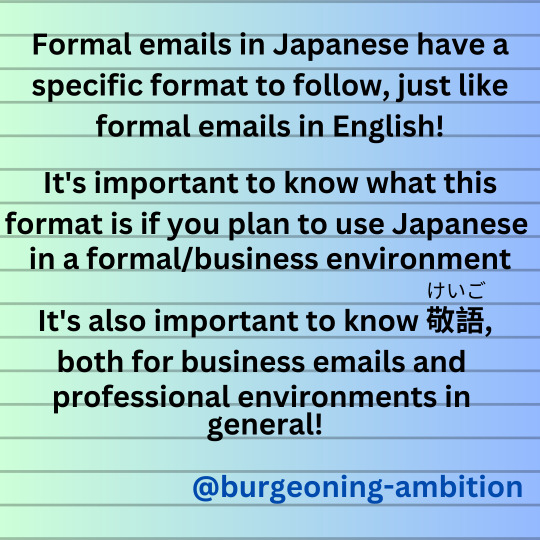
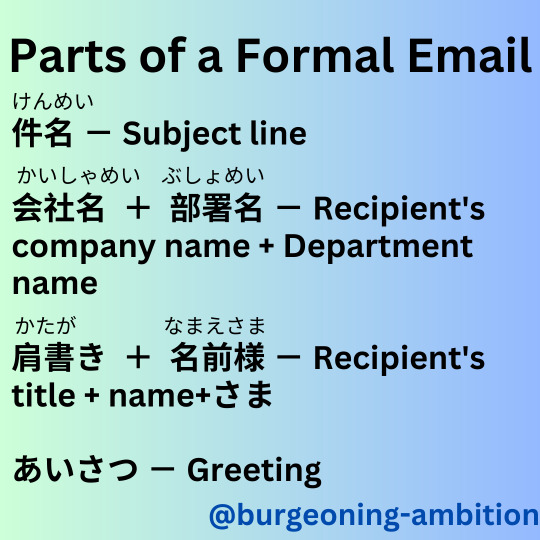

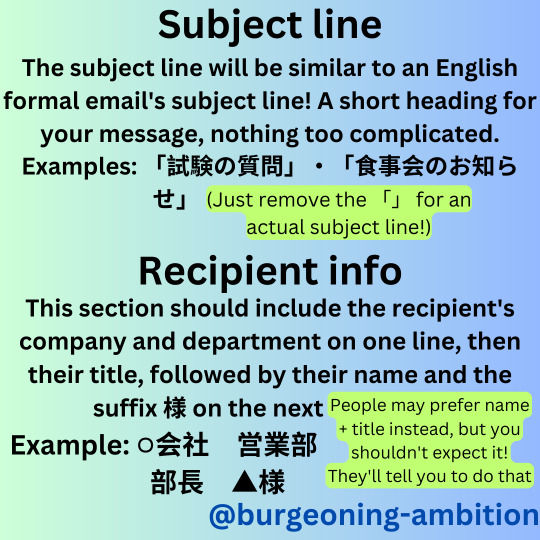

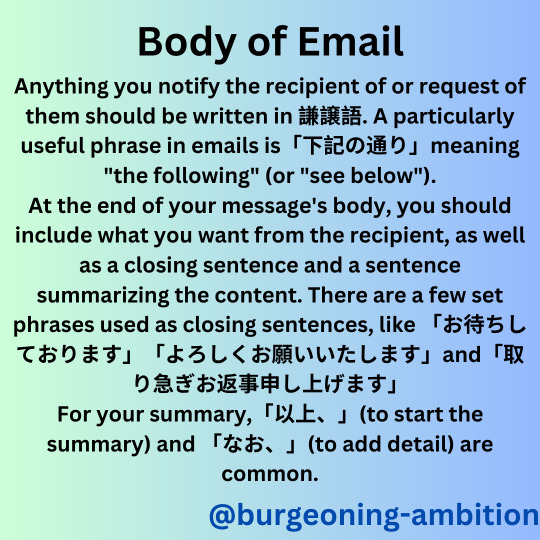
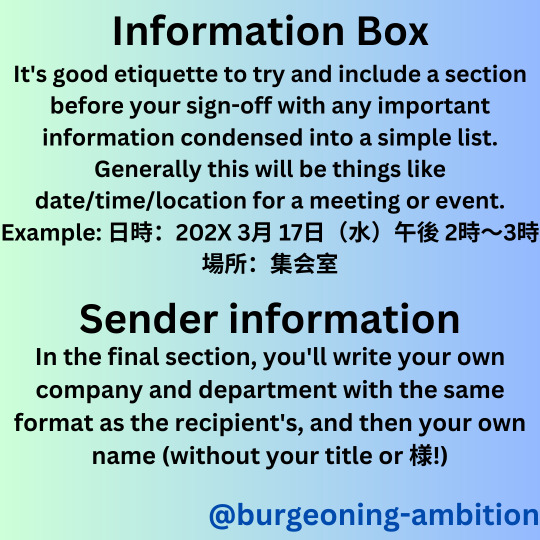
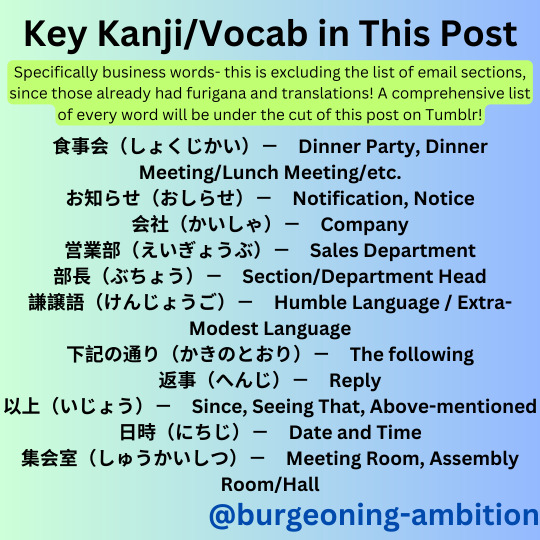

Business Japanese Review Part One: Emails!
I'm not sure how many posts I'll make about Business Japanese, but probably more than one so I say the part one is warranted, haha.
Feel free to add anything or any questions in the notes! Like I said, this isn't a fully comprehensive infographic. Also, what do people think of the lined paper style background for the title page/intro? I think they look kinda cute for the introduction, but not for the informative parts...
One thing I will add that I couldn't fit on the slides: I think some textbooks don't have super clear distinctions between 「謙譲語Ⅰ」 「謙譲語Ⅱ」 and 「ていねいご」, so I only specifically mention 謙譲語 broadly here. Parts of 謙譲語Ⅱ and ていねいご are both described as "extra-modest" in some things, for example! Just keep in mind that my post is a simplification, and if you're interested in formal language, maybe start at learning all of the different keigo categories and what they involve!
Vocab list note: The set phrases in the greetings and closings are all comparable to set phrases in English for greetings and closings of emails. I'm putting these set phrases in their entirety in the list, with a comparable English set phrase as the definition. Do not take these as equivalent phrases! They have a similar feeling, but I am not asserting that they have identical meanings. I'm just offering something comparable in case it helps a person make more sense of them!
The full vocab list + a transcript of the post is under the cut!
Vocabulary List
試験(しけん)- Exam, test
質問(しつもん)- Question
食事会(しょくじかい)- Dinner Party, Dinner Meeting/Lunch Meeting/etc.
お知らせ(おしらせ)- Notification, Notice
会社(かいしゃ)- Company
営業部(えいぎょうぶ)- Sales Department
部長(ぶちょう)- Section/Department Head
「いつもお世話になっております」 - This is a basic email greeting, similar to "Good afternoon" or "Hello, [name]" even though the meaning doesn't match at all!
「だんだん涼しくなってまいりました」 - Similar to "I hope this email finds you well"
さて - Now, Well, Then
謙譲語(けんじょうご)- Humble Language / Extra-Modest Language
下記の通り(かきのとおり)- The Following
返事(へんじ)- Reply
「お待ちしております」 - Similar to "Awaiting your reply"
「よろしくお願いいたします」 - Similar to "Thank you"
「取り急ぎお返事申し上げます」 - Similar to "Please get back to me soon"
申し上げます(もうしあげます)- To Offer, To Extend (thanks, congratulations, greetings, etc.), To Do, To State(謙譲語)
以上(いじょう)- Since, Seeing That, Above-mentioned
なお - Furthermore, In Addition
日時(にちじ)- Date and Time
午後(ごご)- PM (Time)
場所(ばしょ)- Place, Location
集会室(しゅうかいしつ)- Meeting Room, Assembly Room/Hall
796 notes
·
View notes
Text
Phones in Japanese
Some vocabulary for phones in Japanese.

携帯電話 けいたいでんわ mobile phone, cell phone
携帯 けいたい mobile phone, cell phone (abbreviated)
スマートフォン smartphone
スマホ smartphone (abbreviated)
電話番号 でんわばんごう phone number
シムカード・SIMカード SIM card
(携帯) メール (けいたい) メール text message (usually just メール)
通話 つうわ phone call
データプラン data plan
契約 けいやく contract
適法契約 てきほうけいやく legal contract
保証期間 ほしょうきかん warranty period
分割払い ぶんかつばらい installment payment plan
プリペイド式携帯電話 プリペイドしきけいたいでんわ prepaid mobile phone
データ量上限 データりょうじょうげん data cap
ローミング roaming
モバイルネットワーク事業者 モバイルネットワークじぎょうしゃ mobile network operator
ネットワーク受信エリア ネットワークじゅしんエリア network coverage area
サービス状況 サービスじょうきょう service status
サービス停止 サービスていし service outage
セルラーネットワーク cellular network
ワイヤレスブロードバンド wireless broadband
ワイファイ Wi-Fi (usually written as Wi-Fi)
322 notes
·
View notes
Text
why cant kanji just get like... downloaded into my brain
like im just a girl. why must i learn kanji 😞
236 notes
·
View notes
Text
Japanese Reading Resources for Absolute Beginners
A question I encounter often is "How much Japanese should I study before I can begin reading in Japanese?"
From my experience as a learner and reader myself and from managing a Japanese book club for other learners I can honestly say that you can start way earlier than you probably think!
There are many resources that only require knowing hiragana. Those texts usually teach vocabulary through pictures and only use basic grammar.
Some are even simpler than that: The Japan Foundation's Hiragana Books are great for those, who are still remembering hiragana characters. Every short book introduces only 1-2 new characters, so it's a great reading exercise for those who've just started.
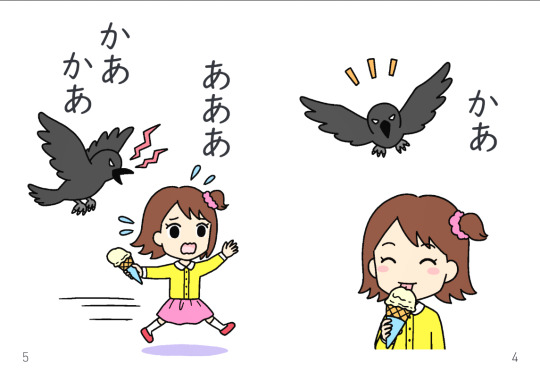
The free graded reader 「どうぞ、どうも」 by the NPO Tagengo Tadoku only uses the words 「どうぞ」 and 「どうも」 to write an entire story. Again, this makes for a great exercise in reading hiragana and understanding context. Another "level 0" recommendation by the same NPO would definitely be 「しろい?くろい?」. This book uses the full range of hiragana characters but the grammar is simple and all used vocabulary is illustrated.
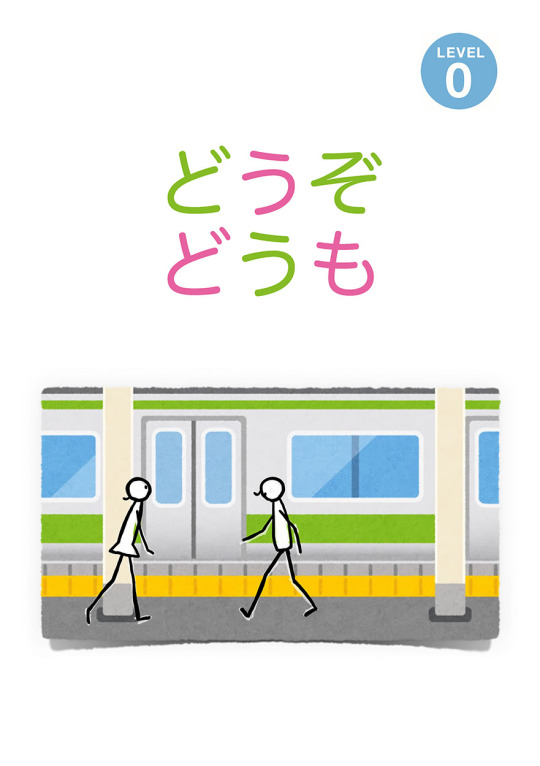
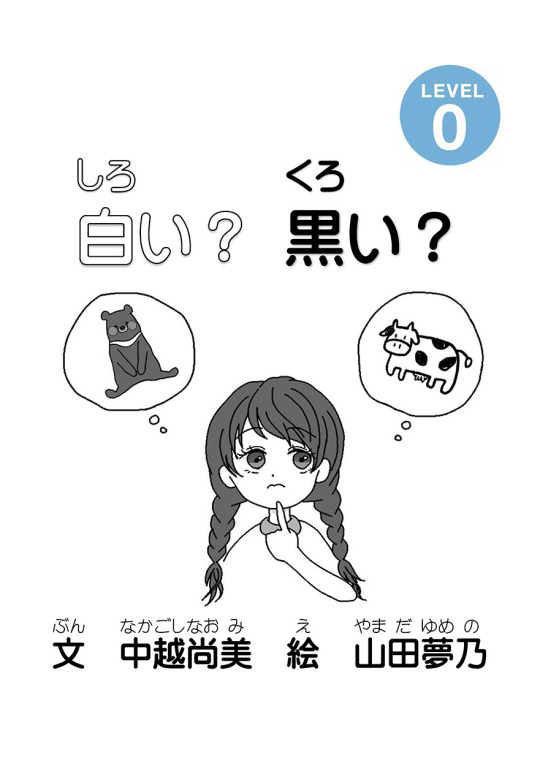
Another site with great resources for absolute beginners is Nihongo Tadoku Dōjō. If you have memorized both hiragana and katakana and know how the particles を and で work you will be able to read this text about stationary (ぶんぼうぐ) and understand everything by looking at the pictures!
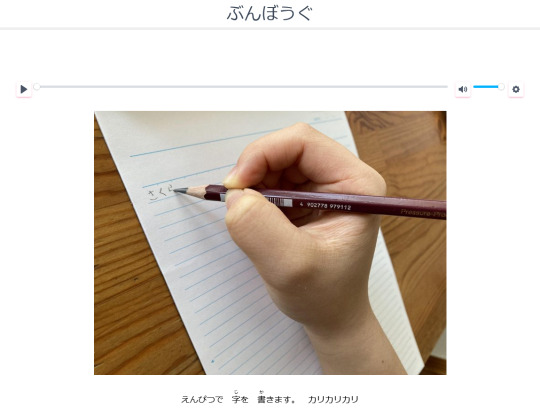
The resources linked so far can all be accessed completely free on the linked websites. If you have the money to spare, please also have a look at the box 「スタート」 from the series reberubetsu nihongo tadoku raiburarī published by the NPO Tagengo Tadoku and ASK (affiliate link). This box includes 8 little books in very simple Japanese.
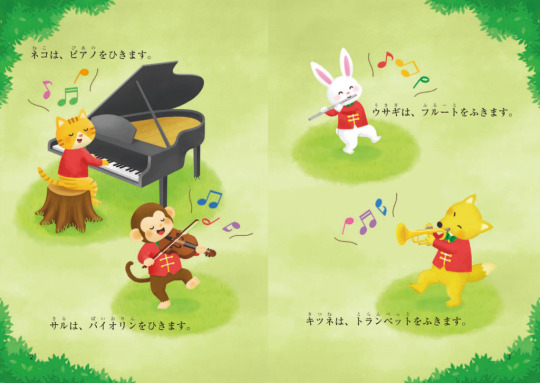
All these texts for absolute beginners will get you started reading in Japanese with very little knowledge of characters and vocabulary.
Reading in Japanese is a skill that requires practice. But once you get used to it, it can be such a valuable tool to reinforce new vocabulary and grammar. So please don't wait until you're "ready" before you start reading - start early at your own level!
1K notes
·
View notes
Text
here are a few podcasts I listen to weekly for practice!
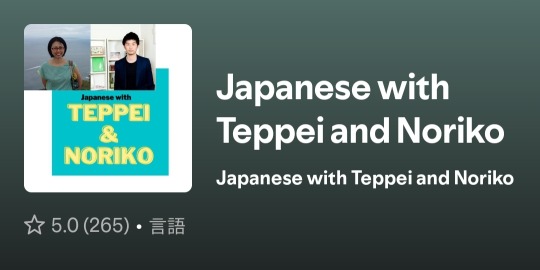
Japanese with Teppei and Noriko
short, concise episodes covering various topics! easy to follow along!

Let's Learn Japanese from Small Talk
longer more detailed episodes with very casual Japanese! they explain some of the vocab they use while speaking (especially slang) and have a vocab list at the end that they go over with a link to read along!

Japanese with Kanako
great for shadowing practice with a few listening exercises mixed in. perfect if you are using the genki series!
what are some podcasts you like to listen to? 教えてください!😊
874 notes
·
View notes
Text

Translation: What a shitshow. This years Eurovision has gone to hell. And it's first and foremost the EBU's fault.
Also, excerpt from the same article:
Throughout the course of the Eurovision Song Contest, the EBU has acted as if they live in a parallel universe. Eurovision is one thing, the world outside something else. The EBU has stuck its head in the sand. Shoved the problem under the rug. Held their hands over their ears and shouted LALALALALA. They appear to have done everything they can to pretend it's possible to hold an apolitical event in a world that's on fire. We have come together to be "united by music", they say, but the sharpshooters on Malmö's rooftops have nothing to do with us! In its struggle to remain apolitical, the EBU has become like a small fascist state in itself, where the artists' space for expression and action has been reduced as much as the undergarments of the Spanish dancers. It is reprehensible.
Reminder again to BOYCOTT EUROVISION 🇵🇸
Don't watch, don't vote.
20K notes
·
View notes
Text
“you don’t like the proliferation of terms like Unalive outside of TikTok because you realize that you’re aging out of youth culture and it makes you uncomfortable!”
no I don’t like it because there’s something INCREDIBLY dystopian about being forced to soften terms for basic parts of the human experience like death and sex (and even more so terms for oppressed minorities- call me a “le-dollar sign-bian” and I will bite you) purely because advertisers and corporations demand it
242K notes
·
View notes
Text
Current Palestine scammers stealing fundraising info and names as their own:
sweatymakerobservations | rahababibu | granddragonsalad | harddinosaurgiver | sweatythinglight | classyartisanavenue | babycupcakecolor | angrykittyluminary
(Copied from my list I added some more names after I shared the post so here’s a quick list update.)
2K notes
·
View notes
Text
Japanese Conversation: Is this A or B?

Let’s learn from a conversation!
A: それはチーズケーキですか、バナナケーキですか? B: これはバナナケーキです。チーズけーきはあれです。 A: Is that a cheese cake or a banana cake? B: This is a banana cake. Cheese cake is that one (over there). A: あれもバナナけーきですか? B: はい、そうです。 A: それとあれおねがいします A: Is that (over there) also a banana cake? B: Yes, it is. A: Give me that and that (over there) please~
…………………………………………
Important Points
Below are some points you might need to know~
これ、それ、あれ Basically これ (kore) is “this” (near speaker). それ (sore) is “that” (near listener). あれ (are) is “that” (over there) which is far from both speaker and listener. Learn more about these words here.
A か B か As you might have known, か (ka) is a question particle. If you didn’t know yet, read this article here. Literally, you’re asking “A? B?”. Translated naturally, it becomes “A or B?”
おねがいします This might be one of the most useful phrases when you’re traveling in Japanese. Use おねがいします (onegaishimasu) to politely ask for what you need. Another word you can use is ください (kudasai). You can learn more about them here.
Happy learning °˖✧◝(⁰▿⁰)◜✧˖°
…………………………………………
Useful Links:
• CrunchyNihongo - Easy to Learn Japanese Lessons Site • Get our easy Japan lessons on your facebook timeline • FREE DOWNLOAD! Resourceful app to start learning Japanese! • Books to guide & help you learn Japanese
212 notes
·
View notes
Text
Duolingo Alternatives by Language
Disclaimer: I haven't used or tested all of them. All resources have different strengths, e.g. Drops being designed for vocabulary. They often aren't full alternatives for Duolingo or formal classes. I just wanted to compile resources for all languages on Duolingo to make the switch easier, especially for the less popular languages.
Feel free to also check out my collection of free textbooks
If you want a more detailed resource list for any of these languages (or perhaps one not listed here) you can send me an ask and I can see what I can do.
Arabic
AlifBee
Arabic Unlocked
Beelinguapp
Bluebird
Busuu
Clozemaster
Drops
Infinite Arabic
Ling
LinGo Play
LingQ
Mango
Mondly
Qlango
Write It! Arabic
Catalan
Bluebird
Clozemaster
Drops
Ling
LinGo Play
LingQ
LyricsTraining
Mondly
Qlango
Chinese
Bluebird
Beelinguapp
Bunpo
Busuu
Chineasy
Clozemaster
Drops
Du Chinese
Hello Chinese
HeyChina
Immersive Chinese
Infinite Chinese
Ling
Lingodeer
LinGo Play
Lingopie
LingQ
Mango
Mondly
Pleco Chinese Dictionary
Qlango
Czech
Bluebird
Clozemaster
Ling
LinGo Play
Mango
Mondly
Qlango
Danish
Babbel
Bluebird
Clozemaster
Drops
Ling
LinGo Play
Lingvist
LingQ
Mango
Mondly
Qlango
Dutch
Babbel
Bluebird
Busuu
Clozemaster
Drops
Ling
LinGo Play
Lingvist
LingQ
LyricsTraining
Mango
Mondly
Say Something in Dutch
Qlango
Esperanto
Clozemaster
Drops
Esperanto12.net
Kurso de Esperanto
LingQ
Qlango
Finnish
Bluebird
Clozemaster
Drops
Ling
LinGo Play
LingQ
LyricsTraining
Mango
Mondly
Qlango
French
Babbel
Bluebird
Beelinguapp
Bunpo
Busuu
Clozemaster
Collins French Dictionary
Conjuu
Dr French
Drops
HeyFrance
Infinite French
Lilata
Ling
Linga
Lingodeer
LinGo Play
Lingopie
Lingvist
LingQ
Listen Up
LyricsTraining
Mango
Mondly
Nextlingua
Oxford French Dictionary
Qlango
TV5MONDE
Xeropan
German
Babbel
Bluebird
Beelinguapp
Bunpo
Busuu
Clozemaster
Collins German Dictionary
Conjuu
Drops
DW Learn German
Infinite German
Ling
Linga
Lingodeer
Lingopie
LinGo Play
Lingvist
LingQ
LyricsTraining
Mango
Mondly
Nextlingua
Oxford German Dictionary
Qlango
Xeropan
Greek
Bluebird
Clozemaster
Drops
Greek Alphabet Academy
Ling
LinGo Play
LingQ
Mango
Mondly
Qlango
Write It! Greek
Guaraní
Clozemaster
Guarani Ayvu
Haitian Creole
Bluebird
Mango
Hawaiian
Drops
Mango
ʻŌlelo Online
Hebrew
Bluebird
Clozemaster
Drops
Ling
LinGo Play
LingQ
Mango
Mondly
Shepha
Write It! Hebrew
High Valyrian
Valyrian Dictionary
Hindi
Bhasha
Bluebird
Beelinguapp
Clozemaster
Drops
Hindwi Dictionary
Ling
LinGo Play
LingQ
Mango
Mondly
Qlango
Hungarian
Bluebird
Clozemaster
Drops
Ling
LinGo Play
LingQ
Mango
Mondly
Qlango
Indonesian
Babbel
Bluebird
Clozemaster
Drops
Ling
LinGo Play
LingQ
Mango
Mondly
Irish
Bluebird
Clozemaster
Collins Irish Dictionary
Drops
Easy Irish
Ling
Mango
Teanglann
Italian
Babbel
Beelinguapp
Bluebird
Bunpo
Busuu
Clozemaster
Collins Italian Dictionary
Conjuu
Drops
Infinite Italian
Ling
Linga
Lingodeer
Lingopie
LinGo Play
Lingvist
LingQ
LyricsTraining
Mango
Mondly
Nextlingua
Oxford Italian Dictionary
Qlango
Japanese
Beelinguapp
Bluebird
Bunpo
Busuu
Clozemaster
Drops
HeyJapan
Hiragana Quest
Infinite Japanese
kawaiiDungeon
Ling
Lingodeer
Lingopie
Lingvist
LingQ
LyricsTraining
Mango
Mondly
Oyomi Japanese Reader
renshuu
Takoboto Japanese Dictionary
Todaii
Qlango
Write It! Japanese
Klingon
boQwl! Klingon Language
Klingon Translator
Write It! Klingon
Korean
Beelinguapp
Bluebird
Bunpo
Busuu
Clozemaster
Drops
Hangul Quest
HeyKorea
Infinite Korean
Ling
LinGo Play
Lingopie
Lingodeer
Lingvist
LingQ
Mango
Mondly
Qlango
Write It! Korean
Latin
Bluebird
Cattus
Clozemaster
Collins Latin Dictionary
Grammaticus Maximus
Latinia
Legentibus
LingQ
Mango
Mondly
Perdisco
Qlango
Vice Verba
Navajo
Navajo Language Renaissance
Navajo Language Program
Speak Navajo
Norwegian
Babbel
Bluebird
Clozemaster
Drops
Ling
LinGo Play
Lingvist
LingQ
Mango
Mondly
Mjolnir Norwegian
Norskappen
Qlango
Polish
Babbel
Bluebird
Busuu
Clozemaster
Drops
Ling
LinGo Play
Lingvist
LingQ
LyricsTraining
Mango
Mondly
Qlango
Portuguese
Babbel
Beelinguapp
Bluebird
Bunpo
Busuu
Clozemaster
Collins Portuguese Dictionary
Drops
Infinite Portuguese
Ling
Lingodeer
Lingopie
LinGo Play
Lingvist
LingQ
LyricsTraining
Mango
Mondly
Nextlingua
Qlango
Romanian
Bluebird
Clozemaster
Drops
Ling
LinGo Play
LingQ
Mango
Mondly
Qlango
Russian
Babbel
Bluebird
Beelinguapp
Busuu
Clozemaster
Collins Russian Dictionary
Drops
Infinite Russian
Ling
Linga
LinGo Play
Lingopie
Lingodeer
Lingvist
LingQ
Mango
Mondly
Nextlingua
Qlango
Write It! Russian
Scottish Gaelic
Bluebird
Clozemaster
Go!Gaelic
Mango
Spanish
Babbel
Beelinguapp
Bluebird
Bunpo
Busuu
Clozemaster
Collins Spanish Dictionary
ConjuGato
Conjuu
Drops
Infinite Spanish
Ling
Linga
Lingodeer
LinGo Play
Lingvist
LingQ
Listen Up
LyricsTraining
Mango
Mondly
Nextlingua
Say Something in Spanish
SpanishDict
Qlango
Xeropan
Swahili
Bluebird
Bui Bui Swahili App
Clozemaster
Drops
Ling
LinGo Play
LingQ
Mango
Nkenne
Swedish
Babbel
Beelinguapp
Bluebird
Clozemaster
Drops
Ling
LinGo Play
Lingvist
LingQ
LyricsTraining
Mango
Mondly
Qlango
Turkish
Babbel
Beelinguapp
Bluebird
Busuu
Clozemaster
Drops
Ling
LinGo Play
LingQ
LyricsTraining
Mango
Mondly
Qlango
Ukrainian
Bluebird
Clozemaster
Drops
Ling
LinGo Play
LingQ
Mango
Mondly
Mova Ukrainian
Qlango
Speak Ukrainian
Vietnamese
Bluebird
Clozemaster
Collins Vietnamese Dictionary
Drops
Learn Vietnamese with Annie
Ling
Lingodeer
LinGo Play
Mango
Mondly
Welsh
BBc Cymru Fyw
Bluebird
Clozemaster
Say Something in Welsh
Yiddish
Bluebird
Clozemaster
Mango
Proste Yiddish
Roni Gal Learn Yiddish
Vaybertaytsh
Yiddish Book Center
Zulu
Bluebird
Nkenne
Bonus: Polygloss which claims to be available for all languages as long as there is another user also learning the same language
7K notes
·
View notes
Text
Duolingo Sucks, Now What?: A Guide
Now that the quality of Duolingo has fallen (even more) due to AI and people are more willing to make the jump here are just some alternative apps and what languages they have:
"I just want an identical experience to DL"
Busuu (Languages: Spanish, Japanese, French, English, German, Dutch, Italian, Portuguese, Chinese, Polish, Turkish, Russian, Arabic, Korean)
"I want a good audio-based app"
Language Transfer (Languages: French, Swahili, Italian, Greek, German, Turkish, Arabic, Spanish, English for Spanish Speakers)
"I want a good audio-based app and money's no object"
Pimsleur (Literally so many languages)
Glossika (Also a lot of languages, but minority languages are free)
*anecdote: I borrowed my brother's Japanese Pimsleur CD as a kid and I still remember how to say the weather is nice over a decade later. You can find the CDs at libraries and "other" places I'm sure.
"I have a pretty neat library card"
Mango (Languages: So many and the endangered/Indigenous courses are free even if you don't have a library that has a partnership with Mango)
Transparent Language: (Languages: THE MOST! Also the one that has the widest variety of African languages! Perhaps the most diverse in ESL and learning a foreign language not in English)
"I want SRS flashcards and have an android"
AnkiDroid: (Theoretically all languages, pre-made decks can be found easily)
"I want SRS flashcards and I have an iphone"
AnkiApp: It's almost as good as AnkiDroid and free compared to the official Anki app for iphone
"I don't mind ads and just want to learn Korean"
lingory
"I want an app made for Mandarin that's BETTER than DL and has multiple languages to learn Mandarin in"
ChineseSkill (You can use their older version of the course for free)
"I don't like any of these apps you mentioned already, give me one more"
Bunpo: (Languages: Japanese, Spanish, French, German, Korean, and Mandarin)
77K notes
·
View notes
Photo

I’ve started attempting to translate news articles from this website It’s great for those at the N5 or N4 level ^^
333 notes
·
View notes
Text
JLPT N5 - くなる and くする
This grammar point is very simple. You use くなる when the condition of something becomes a certain way by itself. On the other hand, くする is used when the condition of something is changed by an outside agent (either a person or a thing). In this post, let’s look at these two very basic constructions and how the Japanese works.
Here is your vocabulary:

【The Grammar】
The grammar is very simple. First, you take an adjective or a noun and change them to their adverbial forms. For example, the adjective 長い has an adverbial form of 長く. The noun ひま has an adverbial form of ひまに.
After you make the adverbial forms of the adjective or the noun, you just put it before either なる or する. That’s it!
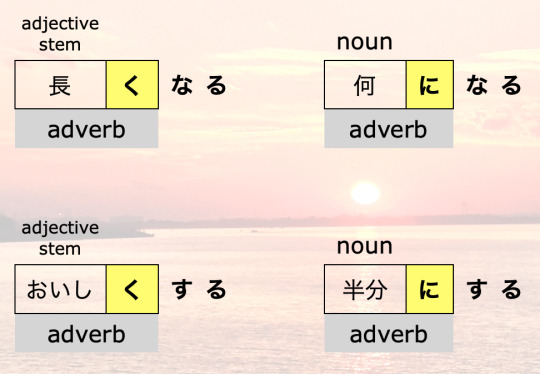
We talked about the く connector in this post and about the adverbial に in this post.
I should point out that while this grammar point appears in most JLPT books and websites as くなる and くする, as you can see in the picture above, nouns don’t use く! For that reason, I choose to call this point adverb ✙ なる and adverb ✙ する.
【adverb + なる】
Here are some examples with なる:
① 熱が下がって、気分がだいぶ{よくなりました}。
=fever will go down and then feeling became considerably better
= My fever went down and then I felt much better.
② この仕事が終わったら、少し{ひまになる}と思います。
= when work finishes, a little bit, will become free, I think
= I think that when work finishes, I’ll have more time.
③ このごろ仕事が減って、前ほど{忙しくなくなった}。
= these days, work decreased and so as much as before, became not busy
= These days, I have less work and so I’m not as busy as before.
④ きみは{大人になったら}、{何になりたい}の。
= when you become an adult, what want to become
= When you grow up, what do you want to be (and explain)?
Some things to notice:
In example 1, the sense is that when the fever went down, the person’s mood got better by itself.
In example 2, the condition of having more free time arises naturally when work decreases. (ひま can have the connotation of having absolutely nothing to do and can be considered rude by some people. I use the word for myself sometimes, but I never seriously refer to other people as ひま.)
Concerning example 3, the negative form of 忙しい is with 忙しくない. If you want to make THAT into an adverb, it will become 忙しくなく. This was very difficult for me when I was just beginning Japanese.
Finally, Example 4 shows that the question word of 何 can be treated as a noun. This makes sense if you think of it as a placeholder for whatever answer the listener will give. Also, because the speaker uses the word きみ we know that the speaker and listener are close. It would make sense if it were a parent-child relationship. きみ is NOT used with people that you have just met or that you don’t know well!
【adverb + する】
Here are some examples with する:
⑤(父が子どもに)もっと部屋を{きれいにしなさい}。
= father to his child: a little bit more the room, make it clean
= Clean up your room a bit more.
⑥ このケーキ、ちょっと大きいから、{半分にして}ください。
= this cake, a bit big and so make it half please
= This cake is a bit (too) big so please cut it in half.
⑦ スカートを5センチぐらい{短かくして}ください。
= this skirt, about 5 centimeters make it short please
= Please shorten this skirt about 5 centimeters.
Notice that examples 5, 6 and 7 all include someone (other than the speaker) making a thing (a room, a cake, and a skirt) a different condition than the current one. This is when you will want to use adverb + する.
【Conclusion】
The grammar points of adverb ✙ なる and adverb ✙ する are pretty simple to understand. That is why they are considered Level N5. Adverb ✙ なる shows a person or a thing becoming a different condition by itself. Adverb ✙ する shows a person or a thing changing to a different condition by a different person or thing.
Thanks for reading, and see you next time!
Rice & Peace,
– AL (アル)
👋🏾
391 notes
·
View notes
Text
New N4 Vocab for today
あさら (彼方, あっち, あち) that way, over there
あちらの方を見る。I will look over there.
あちらは誰ですか?Who's that over there?
あちらに見えるのが日本で一番高い山、富士山です。That thing visible over there is the tallest mountain in Japan. Mt. Fuji.
あんな that (about something or someone distant from both speaker and listener, or about a situation unfamiliar to both speaker and listener), so, such, sort of
あんな人は知りません。I don't know that kind of person.
あんな服は嫌いです。I hate that kind of clothing.
あんな美しい景色を見たのは生まれて初めてだった。Seeing a view that beautiful was the first time since I was born.
あんなに to that extent, to that degree, so much
あんなに勉強したのに… Despite having studied that much...
あんなに冷たい人を見た事がない。I've never met a person that cold.
あんなに優しい人はこの世界に彼女だけだと思います。People that are that nice, I think that she is the only one in this world.
いかが how, in what way, how about, questionable
体調はいかが?How is your health?
暑いので、窓を閉めてクーラーを付けるのはいかが?Since it's hot, how about closing the window and putting on the air conditioner?
ウエイトレス「お水はいかがですか?」 Waitress: 'How about some water?'
いつの間(ま)にか (何時の間にか) before one knows, before one becomes aware of, unnoticed, unaware
いつの間にか夜になりました。It became night before I knew it.
いつの間にか冬休みが終わってしまった。Winter vacation unfortunately ended before I knew it.
来月子供の結婚式があると聞き、いつの間にか小さかった赤ん坊が一人前の大人になったのだと実感しました。When I heard that my child will be married next month, I realized that before I knew it, my once small baby had become a full-fledged adult.
いらっしゃる to come, to go, to be (somewhere), is (doing), are (doing)
先生が教室にいらっしゃる。The teacher is in the class.
お客さんがいらっしゃる。A customer is here.
もうすぐで部長が家にいらっしゃるので、ビールを冷やそう。Because the department manager will come in a moment, let's cool some beer.
Creds to Bunpro for example sentences
39 notes
·
View notes
Text
段々(だんだん) - Gradually, Little by little, Step by step
Can be thought of as meaning ‘step by step’, ‘stepwise’, or even ‘steadily’. だんだん is similar to ほとんど, in that it can modify the meaning of entire phrases, rather than just single words.
だんだん + (と) + Phrase
To use だんだん, simply put it before the phrase that you want to express as ‘(A) that is increasing steadily’.
*While だんだん can take the particle と, it is not required. In fact, と is very often omitted from adverbs/onomatopoeic words (words that represent a sound or motion) in Japanese.
*Don't mix it up with どんどん, which is essentially the antonym of だんだん. どんどん is an onomatopoeic word that represents loud banging (like on a drum), and is used to express fast changes/progression.
だんだん雨が降ってきた。It is starting to rain. (Slow progression, does not imply great speed or severity)
どんどん雨が降ってきた。It is starting to rain. (Rapid progression, may imply great speed and/or severity)
友達が話している:「だんだんとあのやつの事が嫌いになってきていて、今は避けるようにしている。」 Chat between friends: "I gradually came to dislike that guy, and now I do my best to avoid him."
近所の人が話している:「来週からだんだん暖かくなるってニュースで言っていましたよ。」 Neighbors talking: "The news said that it will gradually get warmer from next week."
228 notes
·
View notes
Text
にくい - Difficult to, Hard to
Verb in noun form[ます]+ にくい Polite: Verb in noun form[ます]+ にくい + です
Like 易い (やすい), にくい is an い-Adjective that is regularly attached to the ます stem of verbs, communicating the difficulty of performing the verb that precedes it. In other words, the verb, aka whatever is difficult to do, will always come before にくい.
The nuance of にくい is that a task is difficult to do because of the required skill level or similar factors.
私には英語の「Literally」という単語がとても言いにくい。For me, the English word ‘literally’ is very hard to say. (Hard due to the individual's skill level)
アフリカには行きにくいです。It is hard to go to Africa.
This is different from づらい, which focuses more on a task that is difficult due to being unbearable/hard to endure for some other reason (such as emotional). For example:
お前には本当に言いづらいけど、お前のギターを壊した。ごめん。This is very difficult for me to say to you, but I broke your guitar. I'm sorry. (Hard because the speaker knows that telling the listener will cause a negative response)
85 notes
·
View notes